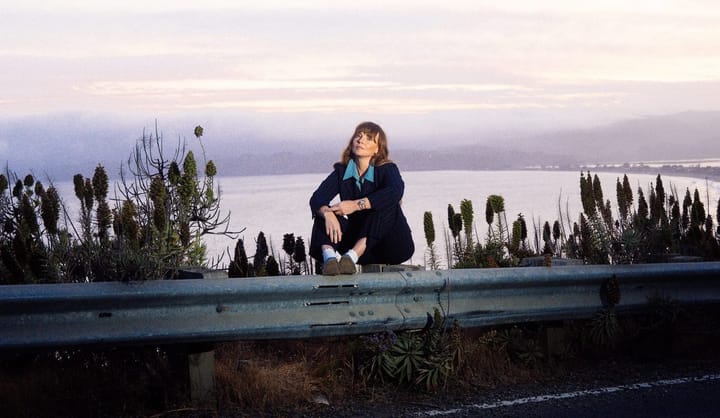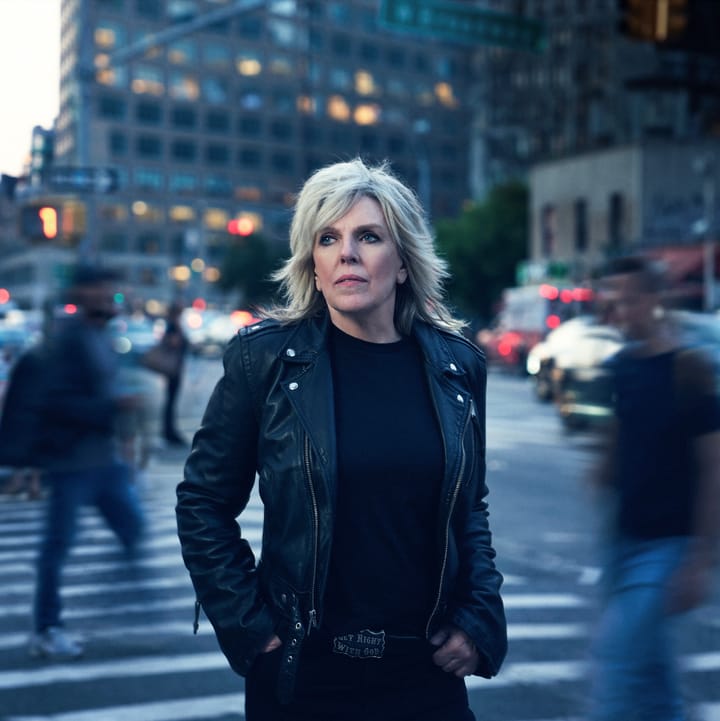Outside the Sheldon Concert Hall in downtown St. Louis, someone steals a van parked next to Norman and Nancy Blake's camper. Inside the hall, the couple have finished a two-hour concert and are packing up to head to Lexington, Kentucky, before returning to their home in Rising Fawn, Georgia. They try to take the commotion in stride, but for them it's another sign that it's time to say goodbye to the road.
St. Louis was the site of Norman Blake's first solo concert, at Washington University's Graham Chapel -- 1972 as he recalls, the same year he released Back Home In Sulphur Springs, his first solo album. For Blake, this most recent return to St. Louis was a nostalgic evening. He plays the first song he ever learned, from his grandmother at age 11: "Spanish Fandango", in open G tuning on the dobro. He learned it in a rudimentary form, then recorded it on that first album, rewriting it with a master's signature.
In 2005, the Blakes played only a dozen or so dates. "Every hour on the stage, that's a happy hour," Nancy says. "You can't get that at home. But for that hour, we might have driven a week, and we're old and it hurts too much and takes away from the pleasure. We've lived a very transient lifestyle. Norman said this morning over coffee that it might take us the rest of our lives to settle down."
Due out January 31 on the small imprint Plectrafone (with distribution by Dualtone), the Blakes' new album is, like Norman's debut, called Back Home In Sulphur Springs. It's a collection of rare and familiar old-time tunes, some original, most derived from the prewar golden age of hillbilly music. It marks the 30th year of a musical marriage with gentle parlor duets shared by two people who genuinely thrive on each other's company and who, if they're going to spend the rest of their lives settling down, know exactly how to do it.
Norman Blake was born in Chattanooga, Tennessee, but was brought to Sulphur Springs before he was a year old. Save for a few years as session musician in Nashville and a stint in the army, he has always made his home in this borderland of Georgia, Alabama and Tennessee.
"It's mountainous," he describes, "the last 50 or 60 miles of the Smokies, Cumberlands, whatever you want to call them. The weather is fairly mild, and we're far enough from the coast not to get the brunt of the storms we've been having. The mountains kinda block off things. It probably is a little isolated. If you're following the Atlanta corridor, Interstate 75 down to Florida, you're in a whole different world. It's a little more quiet on this side of the mountains. There's still a lot of railroad action, just freight haulers, but when I was a child there were passenger trains mixed in. I probably spent half of my young life going out to see them. It was the biggest thing around here."
The second-biggest thing was the radio, and after that, the old 78s for which Blake still goes junking. Mostly the old songs are stored up inside him. They're not exactly memories; they're more like working thoughts, an ongoing conversation with the past. When it comes time to make a record, the Blakes simply put those thoughts down as they occur to them.
"We've never totally planned a set of tunes on a record," Norman says. "I usually just have a working set of stuff; some of it is recorded, some of it is not. I might have twenty tunes that we would want to do. We don't have a set list. It's like being onstage; you have something to start with, and one thing just leads to another."
Although he's clearly known as a guitarist -- a quietly influential flatpicker whose distilled and graceful style has accompanied everyone from Johnny Cash to Bob Dylan, Steve Earle to Joan Baez -- Norman is also proficient on mandolin, fiddle and dobro. His instrumental style, you could say, is about capturing a whole range of nuances in old-time music.
"When I heard the old records and people on the radio, I wasn't thinking about guitar licks," he says. "It was just the music in general. I heard the Carter Family, the Skillet Lickers, the Monroe Brothers and Roy Acuff."
In another sense, Blake is very much a product of the '60s, both as a songwriter with an individual voice and as a guitarist. "I became more aware of [the flatpicking style] in the 1960s," he acknowledges, "when the folk scare, as it's called, was going on, when the LP world came into being. The whole thing changed. Up till then it was the old world, what I heard on the radio and old records. But then in the '60s you got the folk recordings, and that's when I got interested in it in terms of guitar playing. Prior to that I had not heard Doc Watson.
"I played with a thumb and finger pick in my early days, backing up in bluegrass bands, playing more like Maybelle Carter and Lester Flatt. I knew how to use a flat pick because I played mandolin nearly as long as guitar. From time to time I'd pick on the guitar with a flat pick, but I thought it was kind of a novelty. When I heard Doc, I thought, well I can do that! I just never took it seriously.
"Lots of people ask me if I'd heard Clarence White, and no I hadn't at that time. The main flatpick guitarist I heard on record was Don Reno, playing gospel songs. There were some local guitar players, Eddie Smith from off of Sand Mountain, who played with a flat pick, kind of an old-time Riley Puckett-type guitar player who was real good with a flat pick, and I got inspired by him."
Part of what distinguishes Blake's flatpick style has always been his thoughtful, unhurried pacing. Despite the number of notes he can ring from a given chord progression, he lingers over the tones, letting individual notes flow together and accumulate with a slow, steady pressure.
"It's a two-edged sword," he says. "There's many things you can't do with a flat pick that you can do the other way. My playing slowed down after playing with a flat pick. It isn't stretched out, linearly speaking. What I do is based in the arpeggios of chords, doing cross rolls to get those arpeggio effects. You can't do that at the same pace you can play single notes up and down on a string, which is more the approach most guys use.
"I always wanted to be self-contained," he emphasizes. "That was the great thing about Doc Watson. He could sit down with a guitar and sing a song, and it was a complete thing; it didn't require a band. Maybelle Carter was that way. It was full and had everything it needed to support itself."
To find that self-contained sound, Blake lit off on a solo career that ultimately strengthened his work with other musicians. His two records with Tony Rice are landmarks of acoustic music; like the Doc Watson albums he heard in the '60s, they've become touchstones for a younger generation of guitarists.
"I always thought, why the hell would I want to record with Tony Rice?" he says. "I can't keep up with him! He's such a modern player compared to me. It gave a lot of people insights into his playing because he had to play simpler with me."
Blake met Nancy Short at the Exit/In in Nashville in December 1972. She was playing in a folk-rock group slated to open for Blake. "I was impressed, just like everybody else," she says of seeing him the first time. "Back in the day, he was wild. Maybe he hit on me, but I think I hit on him. But who can sort these things out?"
Nancy had grown up in Independence, Missouri, where she studied piano, violin and cello from grade school to high school. She knew jazz as well, from her father, who took her to see Cab Calloway in Kansas City. In the midst of family difficulties, she moved to Nashville, where she finished high school and played cello in the youth symphony.
For Nancy, Nashville in the late '60s was "like Paris in the '20s," and she began to discover a new/old range of stringed sounds. "I started hanging out at the old-time picking parlor on Second Avenue," she says. "Watching Kenny Baker or Charlie Collins fiddle, seeing someone pick up an instrument and play the dog out of it -- I wanted to do that! And I wasn't sure I wanted to devote my life to keeping European traditions alive. I was trying to become the person I wanted to be."
That journey of discovery included applying the cello to hillbilly country. Nancy may be the best-known cellist in old-time music, though she's quick to point out that she wasn't the first. "Maybe I was the only person at that time doing it," she allows. "But Otto Gray and his Oklahoma Cowboys had a cello in their group. Cellos were pretty common at the dances, because they were smaller than basses, and you could throw them in the back of the wagon."
The Blakes' records together have been called "hillbilly baroque," which isn't far from the mark, even if their sound has always been more elemental than refined. The albums Fields Of November (Nancy's 1974 recorded debut with Norman), Blind Dog, and the 1987 compilation Natasha's Waltz are like infrared photographs of old-time music, in which nuances and secret structures are revealed in clean, crystalline detail. Familiar melodies are made strangely beautiful not through complication, but through seeing and hearing into them more deeply. And through, needless to say, the musicians' craft.
"I've just experimented with my own style, through different forms of tunes," Norman says. "I've just been feeling my way through it. I think you could listen to Bill Monroe's early work and the stuff he played just before he passed, and hear a wide range. I call it on-the-job training; if you keep practicing your craft, you're going to be different."
But by 1997 that training had taken a toll. The Blakes separated and divorced, then remarried three years later. "I couldn't take it after twenty years on the road," Nancy says. "I had to fall back and regroup. But we discovered after all the mess we'd been through that we still loved each other."
They've rarely sounded so re-grouped, so at home and at ease as on their new record. When Nancy's voice -- deep and steady, a warm gesture -- enters on the chorus of the traditional "More Good Women Gone Wrong", she completes Norman's knowing phrasing. When her cello fiddles along on the Civil War tune "He's Coming To Us Dead", she gives the ballad another layer of gravity. When she picks the mandolin on "The Star Spangled Banner", Norman follows her lead; together, they more than redeem the much-abused tune.
"I had just heard John Kerry's best speech of his campaign -- that we need more creativity and imagination in this country," Nancy recalls. "I needed that song saved right then and there. Somebody must maintain the ways of peace. Life is so subtle and we need small, nice things to get through life gracefully, not just destroy everything in your path."
Onstage in St. Louis, Nancy had coaxed Norman into singing an original, as yet unreleased topical tune which warned, with humor and pathos: "Don't send your money to Washington/To fight a war that's never done." The Blakes are not known for explicit statements (though songs such as "'72 Blues" and "The Highland Light" have political subtexts), but in a sense, their life's work in music has been an argument for humane and timeless values and principles -- patience, respect, honesty, peace -- which seem quaint in the saying but feel alive and vital in the sounding.
"There's a theory around in music that you just give yourself free rein and let your conscience be your guide," Norman ponders, "but I could never quite get that hung up on my own work, that idea that what fell out of my head was better than something I could go back and relate to. But [the songs] have to have a connection. Sometimes it's just in your own feelings. It might not be there literally; it might just be how you relate to the lyrics and how you relate to the world around you. It doesn't have to be a literal thing."
When ND contributing editor Roy Kasten flatpicks his 1994 Martin HD-28 he sounds nothing like Norman Blake.




Comments ()